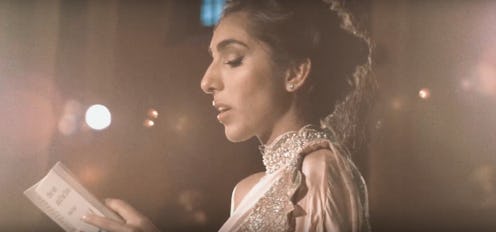Books
Without Rupi Kaur's Poetry, My Life Wouldn't Have Changed In These Significant Ways
Poetry doesn’t often make it into conversations with my friends, let alone my social media feed. However, there is currently a generation of poets rising up and changing that. If you haven’t heard of Rupi Kaur, then you clearly haven’t been hanging out on the right Instagram accounts. She’s phenomenal, cleansing souls left, right, and centre one verse at a time. March 21 marks World Poetry Day, and I can't help but reflect on what Rupi Kaur means to me. As a child, you were more likely to find me on Tumblr than with my head in a poetry book, but I am fully converted thanks to Kaur. There is something so powerful about reading a word, line, or verse, and finding that how you feel is being reflected back to you almost exactly. Kaur does that for me. She makes me feel validated.
With 3.6 million Instagram followers to her name, Kaur has been heralded as queen of the Instapoets, and rightly so. Since 2013, she has been sharing her work on sex, race, love, rejection, abuse, and rebirth on the platform, alongside beautiful line drawings. From the moment I found her account and read a snippet of her work, I was hooked. I had never read anything quite like it. I didn’t know poetry could be like this.
Kaur isn’t simply an internet sensation, however. Her debut collection of poems, Milk and Honey, has sold more than 2.5 million copies, the New York Times reports, and has been translated into 25 languages. Riding the wave of the self-love movement, her second book, The Sun and Her Flowers also became a bestseller. This girl has got talent and, clearly, she's saying something that resonates with our generation.
Verses such as “if you are broken and they have left you do not question whether you were enough the problem was you were so enough they were not able to carry it” were something I didn’t know I needed to hear. After months of dealing with ‘low moods’ that I wasn’t yet prepared to attribute to problems with my mental health and a difficult relationship that made me second guess my self-worth, Kaur’s writing made me realise that it isn’t just OK to like yourself, it's essential to love yourself deeply in order to heal and grow.
Through her work, Kaur reiterates the importance of women lifting other women up. Recognising and being thankful for the work that has gone before you is so crucial, and paving the way for the next generation of girls is the only way to progress, and Kaur captures this in her words. Realising this made me a better friend and a more encouraging work colleague, and it opened my eyes to the phenomenal women that surround me every day.
I always knew that my body was exactly that: mine. However, Kaur's work reminded me that there is a difference between what you think you know and what you truly believe. The notion that someone being able to touch my body was a privilege for that person felt like a foreign, over dramatic concept to me. Her words, “since day one she’s already had everything she needs within herself. It’s the world that convinced her she did not” were so fundamental to me that I got them tattooed on my body. For me and many of my peers, Kaur is great because she came to us through Instagram and her words reflect our own pain and joy. It's like therapy.
Many have criticised Kaur’s work, stating that it isn’t real poetry, that she is overrated, or that she states the obvious but presents it in a pretty way. Kaur is a 26-year-old Punjabi woman taking the poetry world — a world that, for decades, it has been dominated by old, white, privileged male voices — by storm, so it's easy to see why not everyone will understand what she is putting out there. But to ignore how much bravery it takes to put such personal work up for public scrutiny is wrong. It silences the beauty of Kaur's work, which has managed to bring millions of people together through common experiences, all expressed in language that is, yes, simple, but also accessible, elegant, and powerful.
Kaur came to her audience. She recognised that what she was saying would resonate with poetry lovers and the kids that spent years of their lives on Tumblr looking for deep, existential quotes and emo fringe inspiration. I have felt more seen by her words than most people I have spoken to about issues I have had, and, for that, I will be eternally grateful.
